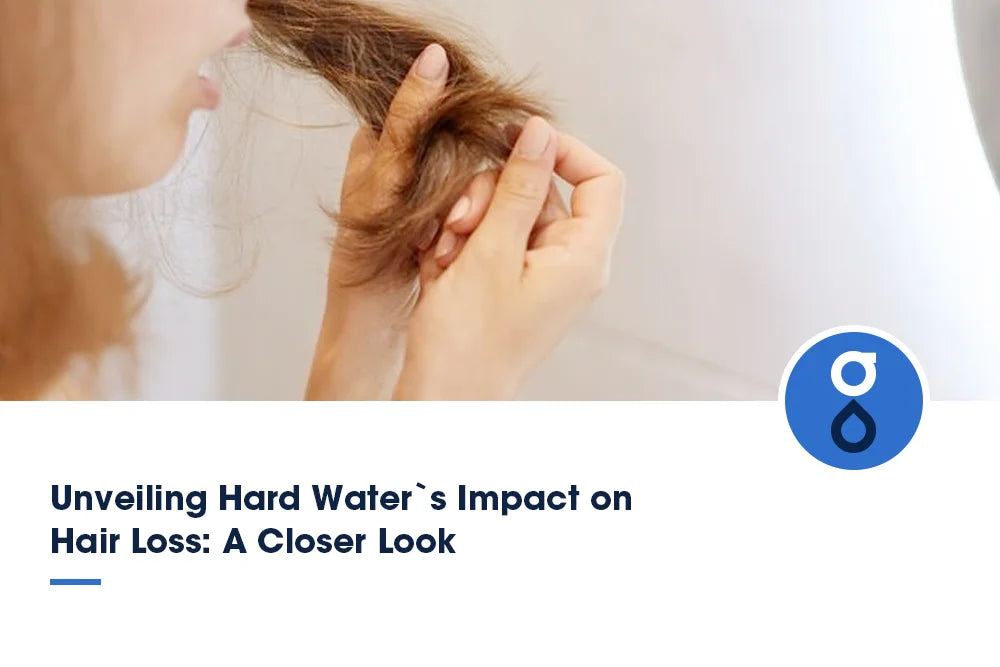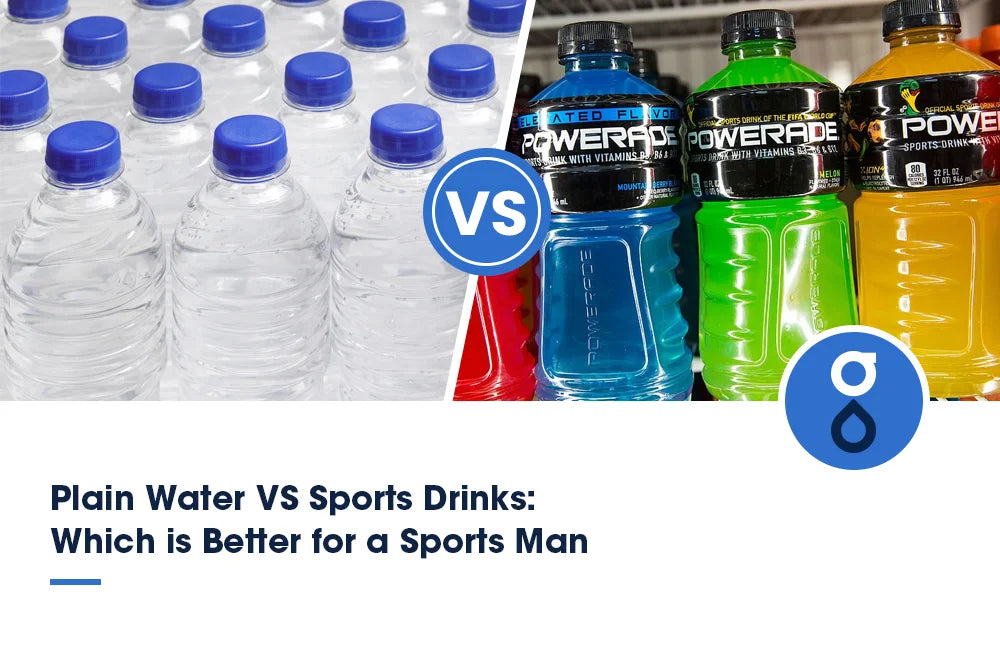Table of Contents:
How much do you know about hard water?
Hard water and hair loss: what`s the connection?
Symptoms of hard water damage on hair
Methods of preventing hair damage from hard water
FAQs
Conclusion
Ever wondered if hard water is secretly sabotaging your hair health goals? While you diligently care for your locks, the culprit might lurk in your daily shower. Hard water's effects on hair loss are common, but understanding the intricacies can shed light on potential solutions for maintaining your mane's vitality. Let's explore how the unseen impact of hard water could be the missing piece to your hair care puzzle.
How much do you know about hard water?

Hard water contains high levels of minerals like calcium and magnesium, which can create buildup on the scalp, leading to issues with scalp health. This buildup may also affect the effectiveness of hair care products, making it harder for them to penetrate the hair shaft and provide nourishment.
The minerals in hard water can make your hair feel rough and dry, altering its natural texture. This change in hair texture may result in increased tangling and breakage, further exacerbating the issue of hair loss. To counter the effects of hard water, some people opt to use water softeners, which help reduce the mineral content in the water.
Hard water and hair loss: what`s the connection?

The correlation between hard water and hair loss is a growing concern among individuals seeking to maintain healthy hair. Hard water, containing high levels of minerals like calcium and magnesium, can lead to mineral buildup on the scalp. This buildup can clog hair follicles, potentially hindering hair growth and affecting scalp health.
When minerals accumulate on the scalp, they can strip away natural oils and disrupt the pH balance, leading to dryness and irritation. This, in turn, can impact hair texture, making it feel rough and brittle. Over time, these conditions may contribute to hair thinning and breakage, exacerbating the risk of hair loss.
Symptoms of hard water damage on hair
Dryness

If your hair feels rough and lacks moisture, hard water could be the reason for its dryness. Hard water contains high levels of minerals like calcium and magnesium that can leave a residue on your hair, making it difficult for moisture to penetrate the strands. This can lead to a lack of hydration, resulting in dry, brittle hair that's prone to breakage.
To combat this issue, consider using a clarifying shampoo to help remove mineral buildup and restore moisture to your hair. Additionally, incorporating a hydrating conditioner or hair mask into your routine can help replenish lost moisture and improve your hair's overall health and appearance.
Dullness
When hard water causes dryness in your hair, it can also contribute to dullness by leaving behind mineral deposits that coat the strands and diminish their natural shine. These mineral deposits, mainly from calcium and magnesium, create a barrier on the hair shaft, preventing light reflection and making your hair look lackluster. The dull appearance may become more noticeable as the mineral buildup increases.
Additionally, the coating left by hard water can make it harder for moisture to penetrate the hair, exacerbating the dullness. To combat this dullness, clarifying shampoos or treatments specifically designed to remove mineral buildup from hard water can help restore your hair's natural shine and vibrancy.
Breakage
To prevent breakage caused by hard water, regularly moisturize your hair and use strengthening treatments to maintain its strength and resilience. Hard water can strip your hair of its natural oils, leaving it dry and prone to breakage. When your hair lacks moisture, it becomes brittle and more susceptible to splitting and breaking.
Look for deep conditioning masks or leave-in conditioners that can help restore hydration to your hair. Additionally, incorporating protein treatments into your hair care routine can strengthen your hair shaft and reduce breakage. Be gentle when handling wet hair to avoid further damage, and consider using a wide-tooth comb to detangle instead of brushing to minimize breakage.
Frizz

Combat frizz caused by hard water by incorporating anti-frizz serums or oils into your hair care routine. Hard water can strip your hair of its natural oils, leading to dryness and frizz. Look for products containing ingredients like argan oil, coconut oil, or shea butter to help tame frizz and add moisture.
After washing your hair, apply a small amount of serum or oil to the mid-lengths and ends to smooth down the cuticle and reduce frizz. Additionally, using a wide-tooth comb instead of a brush can help prevent further damage and breakage.
Scalp irritation
Hard water may cause scalp irritation due to its mineral content, which can disrupt your skin's natural balance. When these minerals accumulate on your scalp, they can clog pores and lead to dryness, itching, and redness.
The pH level of hard water is higher, making it harsher on your scalp and stripping away its natural oils, leaving it vulnerable to irritation. If you're experiencing scalp irritation from hard water, you may notice increased sensitivity, flakiness, or even dandruff.
Consider using a clarifying shampoo to remove mineral buildup or installing a water softener in your home to alleviate this discomfort. By taking steps to combat the effects of hard water, you can help restore your scalp's health and comfort.
Methods of preventing hair damage from hard water
Water softening shower head
To combat the effects of hard water on your hair, consider upgrading to a water-softening shower head for a gentler washing experience. Hard water can leave your hair feeling dry and brittle due to the high mineral content. Installing a water softening shower head can reduce the mineral buildup and enjoy softer, smoother hair. These shower heads work by filtering out the minerals that contribute to the hardness of the water, resulting in a more gentle wash for your hair.
Filtration systems for home

To address the issue of hard water and its damaging effects on your hair, consider installing a home filtration system like reverse osmosis system. A whole-house water filtration system can help remove minerals like calcium and magnesium that cause water hardness. These systems pass water through filters that trap impurities, leaving you with softer water that won't strip your hair of its natural oils.
Look for filtration systems specifically targeting hard water minerals to protect your hair. Investing in a home filtration system ensures that the water coming out of your taps is gentler on your hair, reducing the risk of damage and keeping your locks healthy and vibrant.
Clarifying shampoo treatment
Combat the residue from hard water on your hair with a clarifying shampoo treatment. Clarifying shampoos are specially formulated to remove build-up from hard water minerals, styling products, and excess oils that regular shampoos may not effectively cleanse.
Use a clarifying shampoo once a week to clean your hair and scalp deep. When applying the shampoo, focus on massaging it into your scalp to remove impurities. Allow the clarifying shampoo to sit briefly before rinsing thoroughly with warm water. Follow up with a conditioner to restore moisture and prevent dryness. Incorporating a clarifying shampoo treatment into your hair care routine can help maintain healthy, clean hair despite hard water challenges.
Apple cider vinegar rinse

Consider incorporating an apple cider vinegar rinse into your hair care routine to combat the effects of hard water and restore your hair's natural shine and health. Apple cider vinegar helps balance the pH levels of your scalp, removing buildup caused by hard water minerals and products. To make the rinse, mix one part apple cider vinegar with two parts water.
After shampooing:
- Pour the mixture over your hair and massage it onto your scalp.
- Let it sit for a few minutes before rinsing thoroughly with water.
- Using this rinse once a week can help clarify your hair, making it smoother and shinier.
- Remember to follow up with a conditioner to keep your hair moisturized.
Protective hair masks
If you're looking to further enhance your hair's health and resilience against hard water damage, incorporating protective hair masks into your routine can be highly beneficial. These masks provide deep conditioning and nourishment, helping to strengthen your hair strands and protect them from the harsh effects of hard water minerals.
Look for masks that contain ingredients like shea butter, argan oil, or coconut oil, as these can help hydrate and repair your hair, leaving it softer and more manageable. To maximize the benefits, consider using a protective hair mask once a week or as needed based on your hair's condition. Adding this simple step to your hair care routine can go a long way in maintaining the health and vitality of your hair.
FAQs
Can hard water lead to other scalp issues besides hair loss?
Hard water can cause various scalp issues beyond hair loss. It may lead to dryness, itchiness, and dandruff due to mineral buildup. Using clarifying shampoos or installing water softeners can help alleviate these problems and promote healthier hair and scalp.
Can hard water cause hair color to fade more quickly?
Yes, hard water can cause hair color to fade more quickly. The minerals in hard water can strip away the dye molecules from your hair, leading to a faster loss of color vibrancy and intensity.
Conclusion
Overall, hard water can have a detrimental impact on hair, leading to dryness, breakage, and ultimately hair loss. It's important to be aware of the effects of hard water on hair and take proactive steps to prevent damage. By using water softeners, clarifying shampoos, and incorporating deep conditioning treatments, you can help maintain the health and vitality of your hair. Don't let hard water get in the way of your hair goals. Take action to protect your locks!
















